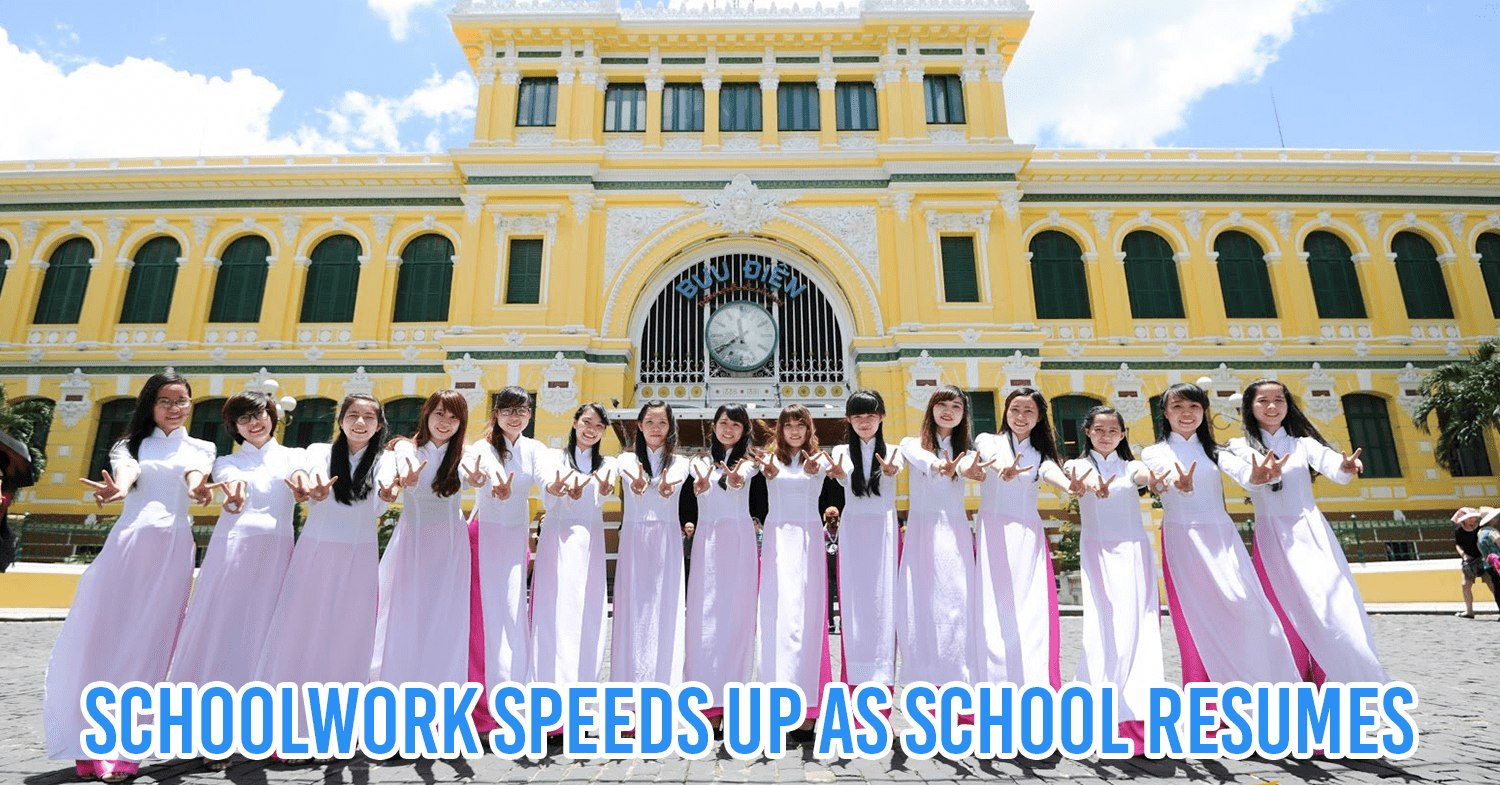Students cram in school to make up for lost learning time
As the cases of COVID-19 escalated in Vietnam earlier this year, many public venues and institutions, including schools, were asked to shut down. To keep the learning going, a majority of Vietnamese students had to resort to online learning.
Learning from home during lockdown was not without challenges, such as its total dependence on internet speed and students finding it difficult to concentrate.
After a series of relaxation measures following the lift on the lockdown, Vietnamese students filed back into class earlier this month and were faced with another no less challenging situation – increased school work to make up for lost time.
Ho Chi Minh City combines physical learning and online learning
For 2 months, all students in Vietnam from primary school to university were quarantined at home. Even though they attended online classes regularly and were given homework, online learning cannot help many students concentrate and absorb knowledge the same way physical learning does.

Image credit: Ngô Bá Khảm
In response to the request of the Ho Chi Minh City Department of Education & Training, schools had to conduct exams to assess students’ performance during the home-based learning period. Based on the assessment results, schools will need to come up with suitable class schedules to make sure that all students complete the required academic curriculum of the year 2019-2020.
To help the students keep up academically with their graduation schedules, which are around the final week of June, many schools in Ho Chi Minh City are combining physical learning and online learning.
After that, students will have a holiday of about one month before the new school year begins in September.
The city also broadcasts revision lessons on TV multiple times a day to assist students in their study as much as possible.
Not all students were able to absorb information from online learning
However, people have different opinions on how to assess students who studied online.
“It’s very difficult to assess the study performance of a student based on online learning. Learning from home is just a small part. Once students are back in classes, teachers must help them revise what they learned before letting them sit for exams and make assessments,” said Professor Nguyen Minh Ha, principal of Ho Chi Minh City Open University.
Another post-COVID-19 predicament for schools in Ho Chi Minh City is that not all students had access to online learning during the lockdown.

Image credit: Thiên Trần
According to a report from the Ho Chi Minh City Department of Education & Training, 20%-50% students in Ho Chi Minh City didn’t join online classes, mostly because they lacked the required equipment such as computers or a stable Internet connection. Lack of discipline in home-based learning also played a part.

Image credit: Tony Quang
Senior students had the highest online class attendance rate, which was 88.31%, according to the report. The younger the other students were, the lower their attendance rates.
Parents demand less school work
To make up for the lost time in school for the past few months, Ho Chi Minh City students are now faced with a heavier school workload and higher examination pressure than ever.

Image credit: Tin giáo dục TP. Hồ Chí Minh
Phạm Ngọc, a student from Ho Chi Minh City, commented on a post in a Facebook forum for students, “Online learning is not as effective as physical learning. It’s difficult to ask teachers about things that I don’t understand. The teaching sessions went on for too long, yet were too fast, so it was hard to catch up. We students had to deal with a huge amount of exams and homework as soon as we were back to school. I hope there will be a reduction in the school workload.”
Students are not the only ones facing difficulties in adapting to post COVID-19 school life. Their parents, who have to watch them study hard and help them with their homework every day, are also feeling the heat.

Image credit: Hội Phụ huynh TP. Hồ Chí Minh
“My child has 5 classes per day, out of which 3 or 4 are exams,” Mai Alison, a parent commented on a post in a forum for students’ parents.

Image credit: Hội Phụ huynh TP. Hồ Chí Minh
Facebook user Phan Minh suggested, “The curriculum should be streamlined by temporarily removing classes that are not necessary for exams, such as Physics and Information Technology, as well as reducing the amount of homework.”
However, there are also parents who have more positive outlooks on the intensified school work.

Image credit: Hội Phụ huynh TP. Hồ Chí Minh
Diệu Tuyết, a parent from Ho Chi Minh City, gave a different opinion in the comment section of the post. She said, “Students are making up for the 2 months of no physical learning. All the best! You guys have to do it anyway. Once you complete your curriculum, you can start your summer holiday.”
It’s necessary to make up for lost school time
Nobody wants to work extra hard to complete 2 or 3 months’ worth of school work within a month, but making up for lost school time is necessary. Teachers are also putting in the best effort to help students achieve their academic goals, so it will be more helpful if students and parents can work together.
Putting exams and homework aside, just remember that knowledge is of utmost importance and it determines how far you can go in your future academic life. If you want to graduate, you need to study.
Also check out:
- Vietnamese police to carry out roadside vehicle checks
- Vietnam reopens nightlife entertainment hubs
- More job opportunities for Vietnamese as COVID-19 lockdowns are relaxed
Cover image adapted from: Le Duy Hung
Enjoying The Smart Local Vietnam? Follow us on Facebook and LinkedIn for more stories like this.
